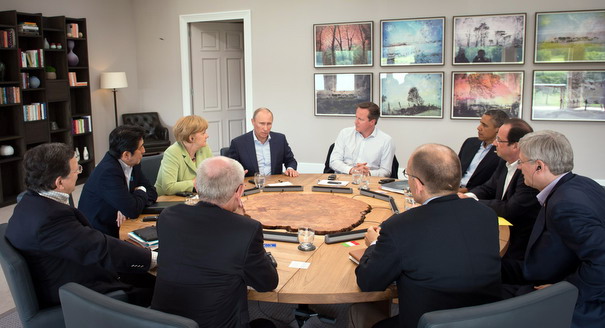The final statement of the G8 Summit held in Northern Ireland this week avoided divisive issues, such as the U.S. plan to deliver military aid to the Syrian opposition. The G8 called for an urgent peace conference on Syria to be held in Geneva, but the prospect of such a conference is vague, given that the Syrian opposition stands firm on President Assad’s resignation as a precondition for peace talks. Meanwhile, the G8 communiqué does not as much as mention Assad’s name. The G8 document sounds empty, and can barely be seen as offering a solution to the Syrian conflict.
That the final communiqué was signed by all the G8 members can hardly delude anyone: the disagreements between Russia and the other Seven look deeper than ever. The Canadian Prime Minister Stephen Harper stated the obvious when he said on Monday that “this is G7 plus one.”
Ironically it was in Canada that Russia, over a decade ago, was confirmed as a full-fledged G8 member and granted a permission to host the G8 Summit in 2006. The statement issued in 2002 at the G8 Summit in Kananaskis today sounds utterly unthinkable: “This decision reflects the remarkable economic and democratic transformation that has occurred in Russia in recent years and in particular under the leadership of President Putin.”
That wording implied that the G8 membership was granted (after years of partial membership) as a reward for Russia’s progress and encouraged its president to stay the course. This emphasized Russia’s difference from its fellow G8ers who had joined the club in mid-1970s: The first six nations got together in 1975 in what was conceived as a forum for the world’s major industrialized democracies; the following year they were joined by Canada—unlike Russia, with no trial period.
Russia has not lived up to the expectations that were laid on her back in 2002. Russia’s dissimilarities from its G8 fellow members are fairly strong and include, to mention just a few, its increasingly authoritarian political regime, its geopolitical vision, as well as its status as an emerging market (it is a member of BRICS, while the other seven belong to the OECD). With increasing assertiveness Russian officialdom claims that Russia does not share Western values.
This rift within the G8 seriously reduces the Group’s relevance in tackling global issues. But in fact, the G8 relevance has been on decline even regardless of Russia’s dissent. The judgment and recommendations of the seven “major industrial democracies” may have mattered back in the 1970s, but over the past years their authority or their capacity to offer solutions to world problems has been repeatedly called in doubt. The rise of emerging markets, China first and foremost, but also India and Brazil, has led to the foundation of the G20—an obvious challenge to the G8 stature.
In fact, the problem with supranational authority is broader than the declining influence of the G8. After the end of the cold war, as the major confrontation of the two poles receded into history, the concept of the “international community” has become problematic. In a world that gets increasingly fragmented—call it multipolar—the ability of international actors to make a difference is strongly limited, especially when it comes to dealing with armed conflicts or inhuman regimes.
